If you’ve been keeping chickens for a while, you probably experienced an unexpected death which led you to ask yourself, can chickens have a stroke? Yes, chickens can have a stroke, and it probably happens more often than people realize.
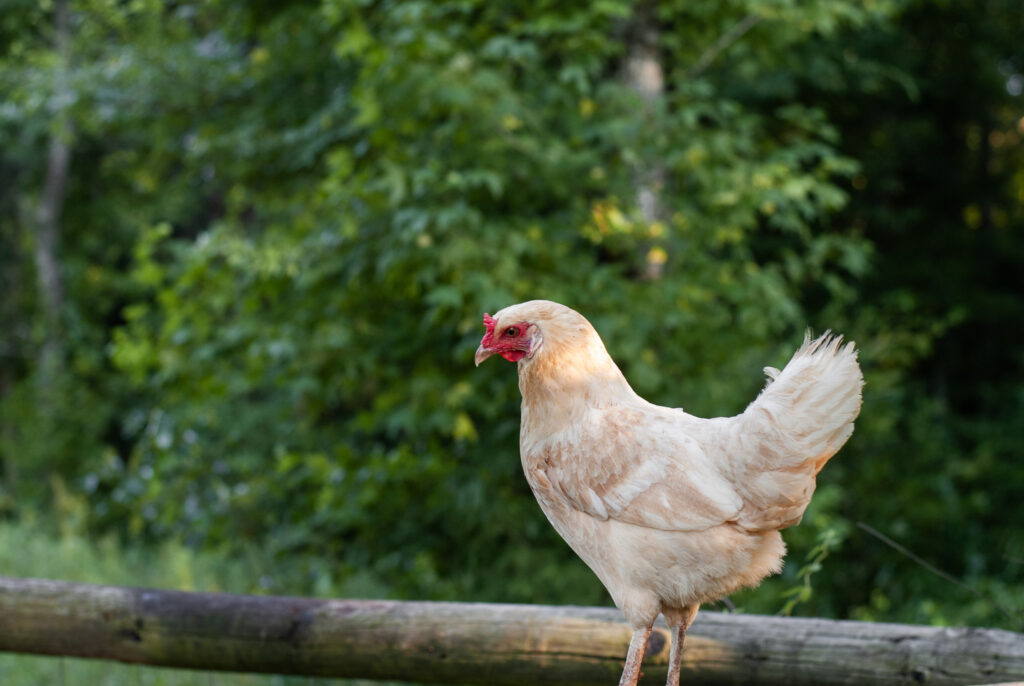
Just like us, chickens in backyard flocks can experience health issues that might not be immediately obvious. Learning to recognize the clinical signs of a stroke in your chickens is important because it could mean the difference between life and death for them.
By being aware of the symptoms, like sudden weakness or difficulty moving, you can catch problems early and help your flock recover faster.
Disclaimer: I am not a veterinarian; however, I am a chicken keeper and a registered nurse. The opinions shared in this article come from my observations of my own flock. If your chicken is showing signs of illness, it’s always best to seek the advice of a qualified veterinarian.
*This post may contain affiliate links which means I make a small commission at no extra cost to you. Read my full disclosure here.*
Neurological Disorders in Chickens
Chickens can suffer from a variety of neurological disorders that can look a lot like a stroke. Diseases like Marek’s disease, Newcastle disease, botulism, and egg yolk peritonitis are known to cause serious problems in backyard chickens, including paralysis.
For instance, Marek’s disease leads to inflammation and tumors that put pressure on the bird’s brain and spinal cord, causing symptoms like tremors and partial paralysis.
Similarly, Newcastle disease can cause nerve damage, leading to loss of balance and other neurologic issues.
While these symptoms might seem like a stroke, they’re not always the same type of stroke we think of in humans. Diagnosing the exact cause of these symptoms can be really tough without examining the bird after death, which is why these conditions often result in high mortality.
Understanding these diseases can help you better care for your flock, even though it’s not always easy to know what’s really going on.
Causes of Strokes in Chickens
One of the most common causes of strokes in chickens is heat. Chickens naturally have a much higher body temperature than humans, which makes them especially vulnerable to heat stroke and heat exhaustion on hot days.
Some breeds are better suited for hot weather, but even then, it’s important to be cautious.
I recently lost my beloved chicken, Tina, to heat stroke, which was a tough reminder of how serious it can be. Feathering and the size of their comb can impact how well chickens handle the heat. Larger combs help them cool down more efficiently, while heavy feathering can make it harder to stay cool.
Chickens don’t sweat like we do, so they have to find a shaded area and drink cool water to lower their core body temperature. When they’re hot, you’ll often see them panting like dogs and spreading their wings out to increase airflow.
Keeping an eye on their water intake and providing plenty of cool places to rest can make a big difference in preventing heat-related issues.
Signs and Symptoms of a Heat Stroke in Chickens
Signs of heat stroke in chickens can be pretty obvious if you know what to look for.
One of the first things you might notice is a chicken being real lethargic, just laying around in the chicken yard, possibly in a spot where she wouldn’t normally rest. I’ve found hens laying in unusual spots when they’re dealing with heat exhaustion.
Other signs of heat stress include watery poop, decreased feed intake, and a pale comb or wattle. Chickens don’t have sweat glands, so they can’t cool down like we do. Instead, they’ll start breathing rapidly and panting to try to lower their heat production.
Older birds are especially susceptible to extreme heat and may show these symptoms more quickly than younger ones. In severe cases, electrolyte imbalances can make things worse, leading to more serious problems.
Watching for these signs and symptoms can help you act quickly to cool your chickens down before things get too serious.
More Articles You’ll Like
- Which Breeds of Chickens Lay Pretty Purple Eggs?
- What Time Do Chickens Go To Bed?
- Can Turkeys and Chickens Live Together?
- How Do Chickens Clean Themselves?
How to Prevent Chickens from Having a Heat Stroke
Ventilation
Preventing heat stress in chickens is all about keeping them cool during periods of extreme heat. Because chickens have a naturally high body temperature, it’s important to take preventative measures, especially in hot climates.
One of the best ways to do this is by providing adequate ventilation in their coop. If chickens are kept in an enclosed area without proper airflow, the air temperature can rise quickly, causing their body temperatures to spike.
A well-ventilated coop that promotes airflow helps keep the air cooler, making it easier for chickens to regulate their normal body temperature.
Free-range chickens have an advantage because they can find natural shade and cooler spots with a breeze, lowering their risk of heat stress.
Keeping your flock cool and comfortable is key to preventing serious health issues during those hot summer days.
Water
Providing plenty of fresh water is crucial to preventing heat exhaustion in chickens, especially during the heat of summer. Chickens need a lot more water when the weather is hot to help regulate their internal body temperatures.
Clean water is also essential for their overall health, as dirty water can lead to illness.
I like to freeze large blocks of ice to add to their waterers during the hot months. This keeps the water cold and nice for the flock.
I also love my automatic waterer because it’s attached to a water hose, ensuring a steady supply of fresh, cool water. Without adequate cool water, chickens can quickly become dehydrated, leading to heat stress and even death.
Keeping their water supply cool and clean is one of the simplest and most effective ways to protect your flock during the summer.
Vitamins and Electrolytes
Just like us, chickens need extra electrolytes when they’re hot. It’s kind of like how we reach for a sports drink when we’ve been sweating a lot.
Adding electrolytes and vitamins to their water helps chickens better tolerate heat and maintain their health by supporting their circulatory system and internal organs.
In hot weather, chickens breathe rapidly to cool down, but this can cause them to blow off too much carbon dioxide, which can mess with their body’s pH balance.
Adding 1/4 cup baking soda to their water can help regulate the acidity level in their blood, keeping their body temperature and overall health in check. This simple step can go a long way in keeping your chickens comfortable during the hot summer months.
Feed Consumption
Hot temperatures can cause chickens to eat less, which can impact their egg production and eggshell quality. To help keep their energy levels up, they’ll need some extra treats during the day.
Fresh vegetables like cucumbers and squash are great options because they’re hydrating and packed with nutrients. One simple way to keep your flock cool and entertained is by freezing these veggies into an ice block. It’s a fun treat that also helps them stay cool.
Feeding your chickens late in the evening when it’s cooler is another good strategy to increase their feed intake. This ensures they’re getting enough nutrition to maintain healthy eggshell quality and steady egg production, even during the hottest days.
Adding fresh fruits occasionally can also be a tasty and beneficial treat for your chickens.
Other Helpful Ideas
Providing your chickens with wading pools or misters can be a great way to help them beat the heat. Just make sure the pool isn’t too deep. Adding large rocks or bricks to the bottom can give them a safe place to wade without the risk of drowning. While some chickens might love splashing around, others may not be interested at all. It’s important to give them plenty of room to decide for themselves.
You can also set up sprinklers to lightly wet the flock and cool them down. Though chickens might not be thrilled about getting wet, this can be a great way to keep them cool during the hottest part of the day, especially if they’re stuck in direct sunlight.
Cooling them down is an important factor in keeping your flock healthy in extreme heat.
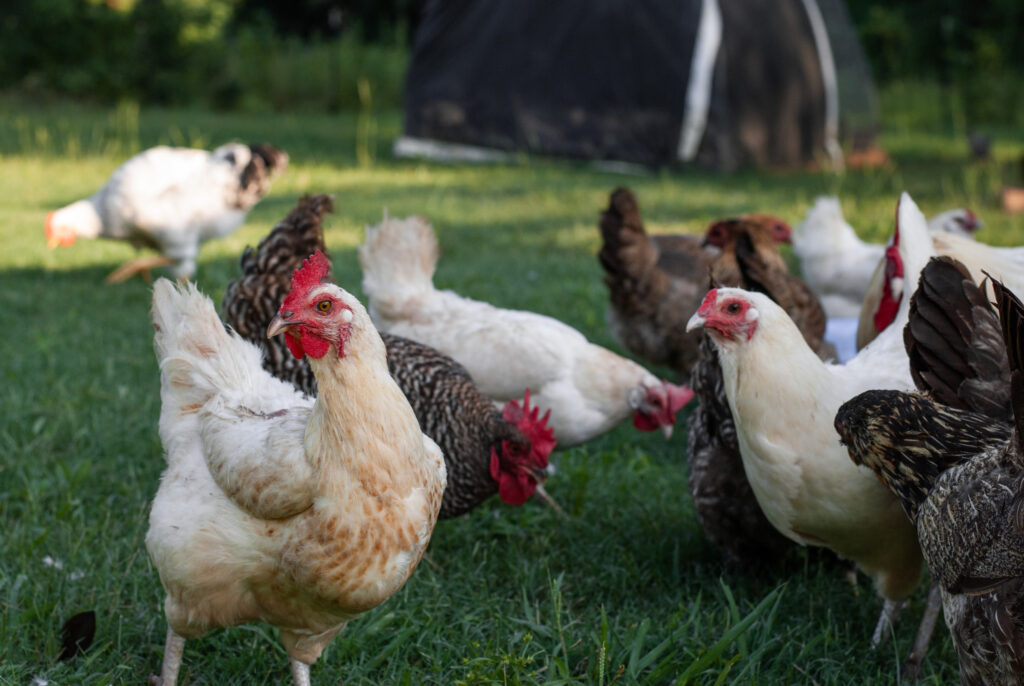
How To Help a Bird in Distress
Relocate it
If you notice a chicken showing signs of heat exhaustion, it’s important to move it out of the coop and into a cool spot right away.
Bringing the bird inside where it’s cooler is best, as it not only helps to lower its body temperature but also prevents other chickens from picking on it, which can happen when a bird is weak or stressed.
Letting her rest indoors for over night will give her a good chance to recover and cool off.
Providing plenty of fresh, cool water is another key step in helping the chicken recovery. Cool water helps rehydrate the bird and brings its body temperature down more quickly.
You can also add electrolytes to the water to help her recover more quickly. See my previous section on electrolytes. Taking these steps can make a big difference in saving your chicken from the dangers of extreme heat.
Wetting it down
If a chicken is showing signs of severe heat stress, cooling it off with water can be very effective. Spraying the bird with a hose or giving it a gentle dunk in a pool of water can help lower its body temperature quickly.
A 5-gallon bucket of cool water works well too. just make sure the water isn’t too cold. You might need to let the chicken soak for a little while to really bring its temperature down.
Using a shallow bowl of water for a quick dip can also be soothing. While this method can be a bit stressful for the bird at the moment, it’s often necessary to save it from the dangers of extreme heat.
Once the bird is cooled down, you can return it to the rest of the flock.
Other Methods of Cooling Chickens
There are several other ways to keep chickens cool during hot weather. One option is to build the chicken coop in a shaded area, which naturally keeps the temperature down and helps with air flow. Using a shade cloth to cover the run area can also block some of the sun and create a cooler environment for the birds.
Free-ranging your flock is another great method, as it allows them to find their own cool spots, like under trees or bushes. When choosing chickens, picking heat-tolerant breeds can make a big difference in how well they handle warm climates.
Heavy breeds tend to struggle more in the heat, so opting for lighter breeds that are better suited for hot weather is a good idea if you live in a warm area. Keeping these tips in mind can help ensure your flock stays cool and comfortable during the summer months.
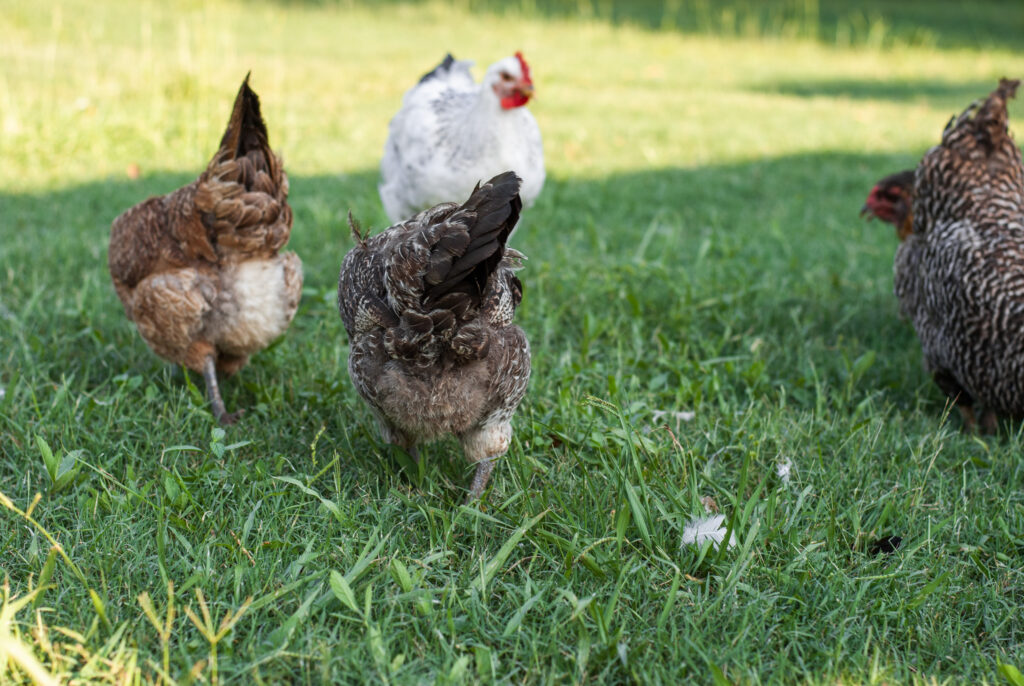
Caring for a chicken after they’ve had a stroke
It is possible for chickens to recover from a stroke, but it requires some extra care and attention. Depending on the symptoms your chicken is experiencing, you may need to adjust their feeding setup. For example, you might need to place their feed higher or lower than before to make it easier for them to reach.
If their coordination is severely impaired, you may even need to be prepared to hand-feed them. After a stroke, a chicken might not be able to walk properly, which makes them vulnerable to predators. To keep them safe, they should be kept in a secure area where they’re out of danger.
Over time, their symptoms may improve, but it’s important not to isolate them from the rest of the flock for too long. Chickens need social interaction, so supervised visits with the flock can help them stay connected while ensuring the others don’t pick on her.
With patience and care, your chicken can still enjoy a good quality of life after a stroke.
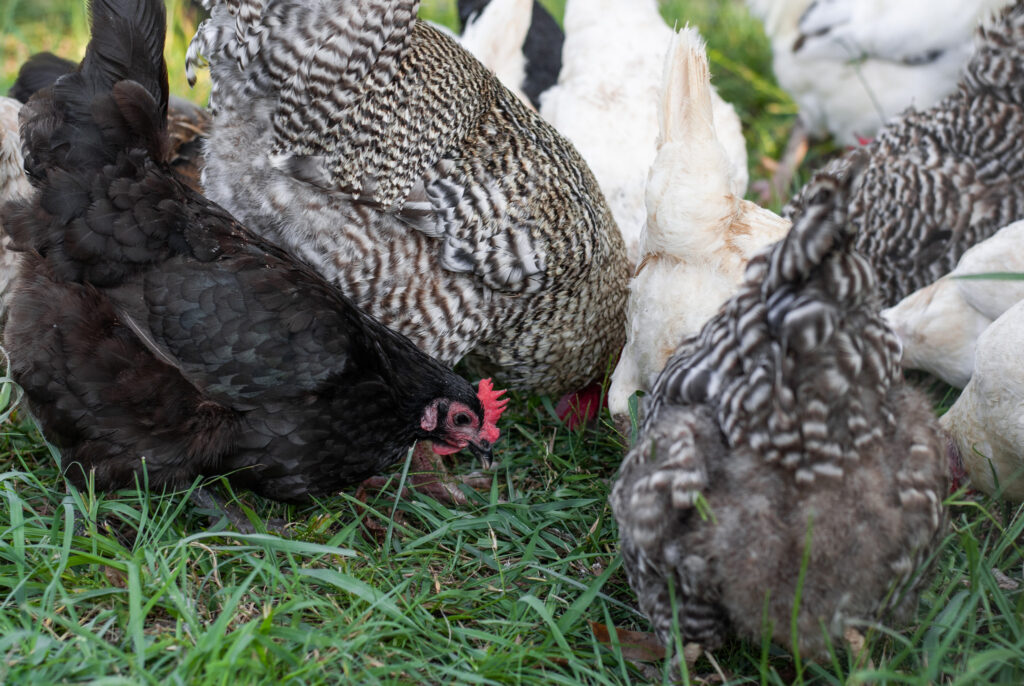
Strokes and Chickens FAQs
Can chickens recover from a stroke?
Yes, chickens can sometimes recover from a stroke, but it depends on the severity. With good care, including rest, cool water, and a calm environment, some birds may bounce back. However, full recovery isn’t always guaranteed.
What should I do if I think my chicken had a stroke?
If you suspect your chicken had a stroke, move it to a quiet, cool area away from the rest of the flock. Provide your chicken with fresh water and monitor its condition. It’s also a good idea to talk with a veterinarian for further advice.
How can I tell the difference between a stroke and another illness?
It can be tough to tell the difference between a stroke and other illnesses like Marek’s disease or heat stress. If you notice signs like paralysis, loss of balance, or unusual behavior, it’s best to consult a vet for a proper diagnosis.
Are certain breeds more likely to have strokes?
Heavy breeds and birds that are more prone to heat stress may be at a higher risk for strokes, especially during hot weather. Choosing heat-tolerant breeds can help reduce this risk.
Can diet affect a chicken’s risk of stroke?
Yes, diet can play a role. Giving your flock a balanced diet with plenty of vitamins and minerals helps keep your chickens healthy. Also, during hot weather, extra electrolytes in their water can support their overall health and reduce the risk of heat-related issues, including strokes.
Should I separate a chicken that had a stroke from the flock?
Yes, it’s a good idea to separate a chicken that had a stroke from the rest of the flock. This prevents other chickens from picking on it and gives the affected bird a chance to rest and recover in a calm environment.
Is there anything I can do to prevent strokes in chickens?
The best prevention is keeping your chickens cool during hot weather, providing plenty of fresh water, and ensuring they have a well-ventilated coop. Choosing heat-tolerant breeds and offering a balanced diet also help lower the risk.
Final thoughts on strokes and chickens
In summary, yes, chickens can have a stroke, though it may not always look exactly like a stroke in humans. Whether caused by heat, underlying diseases, or other factors, it’s important to recognize the signs and act quickly to help your flock.
Keeping your chickens cool, providing plenty of fresh water, and choosing the right breeds can all help reduce the risk. While it can be tough to diagnose the exact cause without a vet, knowing what to watch for and taking preventative measures can make a big difference in keeping your chickens happy.
If you enjoyed this chicken article, pleas share it!
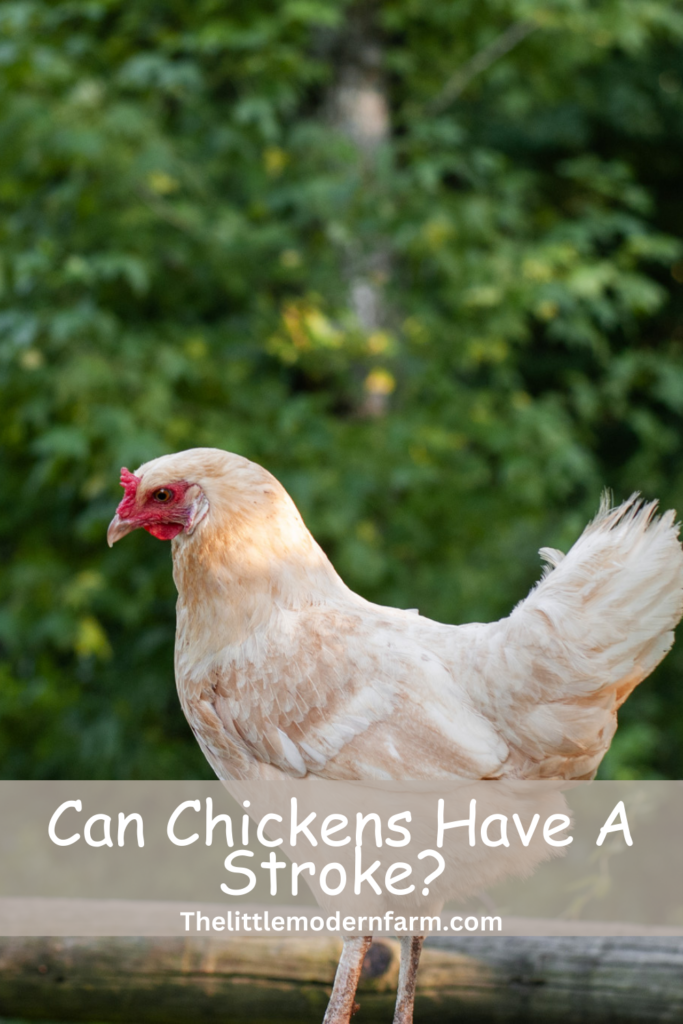
More from the farm
Ever wondered about the best protein for chickens? Chickens need a lot of protein to stay healthy, lay plenty of eggs, and grow strong feathers. Protein helps them build muscle, keep warm, and produce those beautiful eggs we all love.
[…] are prone to heat strokes if they aren’t cared for during times of extreme […]